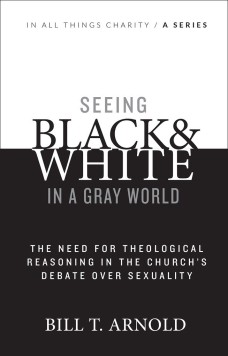“This book has never been about trying to convince you of a particular position on the matter of committed same-sex relationships.”
-Wendy VanderWall-Gritter
It is no secret that the church is consumed by debates about sexuality. Further, it is widely known that Christians are often no better at debating sexuality than Congress is at crafting budgets, approving nominees, or making laws. The sexuality debate, which demands our best resources, often brings out the lesser angels of our nature.
It is in that context that I greatly appreciate Wendy VanderWall-Gritter’s Generous Spaciousness. While it possesses some flaws, it is a valuable contribution to a dialogue that is too often as shallow as it is vitriolic. Much of this has to do with the author’s own background.
VanderWall-Gritter spent many years in what is called the “Ex-Gay Movement,” a loose association of evangelical Christian parachurch organizations that sought to minister to gays and lesbians, though often in ways that were more de-humanizing than caring. Probably the best known of such organizations is the now defunct Exodus International, an umbrella organization notorious for its affiliates’ attempts to re-orient gay and lesbians persons. The author began her ministry following seminary in this kind of environs, but over time began to question some basic tenets. She eventually changed her approach, and that of the ministry (New Directions Canada) she led.
Relationship is central to her ministry, and to the approach of Generous Spaciousness. Thus VanderWall-Gritter is at her best here when sharing the experiences and stories gleaned over a career in ministry with gay and lesbian Christians. Many of them are gut-wrenching. She is also not afraid to discuss taboo areas of this debate, such as reorientation (“praying away the gay” in common parlance), the hypocrisy of conservative Christians who are disgusted by LGBT sexuality but repeatedly fail to live up to their own standards, and the varied views within the gay Christian community itself (which is often taken to be, or presented as, monolithic). She has stories to tell of gay Christians who choose celibacy, and gay Christians who live partnered, and still others who agonize over their sexuality for whole lifetimes. For those of us – like myself – who have a dearth of experience with same-sex attracted Christians, Generous Spaciousness contains a wealth of anecdotes and personal accounts.
Indeed, this would have been a better book if the author focused on stories, which play to her experience, and set aside matters out of her depth – such as exegesis. This would have been a stronger work if it were about 75 pages shorter, shorn of some material that was simply not interesting or outside the range of the author’s expertise. The chapter on Scripture is especially stultifying, and I was immensely frustrated at the butchered reference to the (unnamed and, yes, so-called) Wesleyan Quadrilateral in the chapter on interpretation, which made all the classic errors one is not supposed to make using that particular hermeneutic lens.
Nevertheless, if the strengths and the weaknesses played see-saw, the weaknesses would remain far up in the sky. I especially resonate with VanderWall-Gritter’s desire to adjust what she calls the “posture” of those who participate in this conversation. In most corners of the church, postures about sexuality are rigid, set, and borderline hostile (regardless of which end of the conservative-progressive spectrum one identifies with). But Generous Spaciousness calls us to a different, caritas-shaped posture, one built on respect for the other, for their story, and for our shared need for and love of Jesus Christ.
The quote above, taken from the concluding pages, is especially instructive. While VanderWall-Gritter certainly has her own views and the book leans in a certain way, it doesn’t read like the usual echo-chamber propaganda. Instead, it represents what is for her a very personal journey, some of which may be familiar to her readers and some not. But who else has written a book on this white-hot topic without trying to convince the reader of a particular answer?
If this is book is widely read, as I believe it should be, then I believe the church can move a long way towards a better posture regarding her LGBT children, and a better discussion along the way. Sexuality is a complex and powerful reality, and confronting it demands our best efforts and resources. Generous Spaciousness is one such resource. I’ll let some of the author’s concluding words finish this review:
“I believe it to be crucial that…we focus our hearts on Christ, on his desire that a unified church would be a witness to the world of his reconciling love, and on being the extension of that love to all our neighbors. I believe that hospitality is central to the heart and ministry of Jesus and that to the extent we fail to extend this hospitality to gay people, the church will fail to walk in the way of Jesus.”









